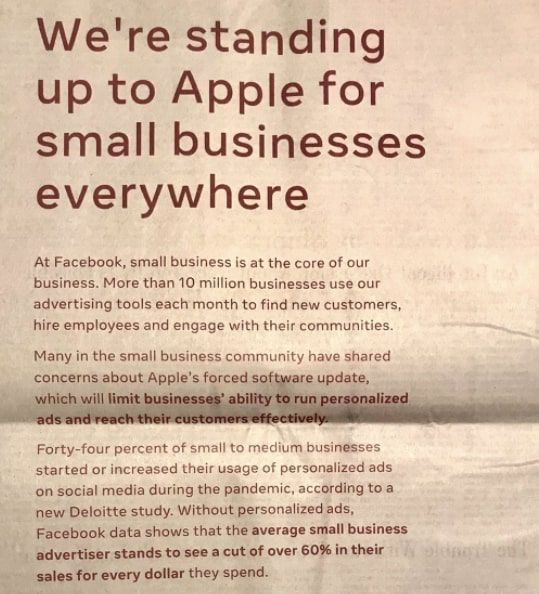By: Tom Murray | Managing Director
Back in the summer of 2020, Apple ruffled the entire marketing industry’s feathers by announcing that iOS 14 was going to have some big changes coming to it. For a full refresher on those changes, they can be found here. For those looking for the “tl;dr version”, the changes are the following:
- Apple will require apps to showcase a message when users download / update their apps to ask them to approve being tracked. It is widely expected that most people, when given the choice, will choose not to be tracked.
- IDFA will be deprecated and no longer be able to track user’s and match their device to their conversion actions.
- Conversion events will be delayed and anonymized.
- Limits to the number of campaigns ad networks can run and have measured.
Apple has pushed back this release to 2021, but there have been some recent developments, with Facebook coming out hard against this change, taking out ads in several newspapers (yes, you read that right), such as The New York Times, The Wall Street Journal, etc to fight against Apple, since they believe that these changes will harm small businesses.
You can see part of Facebook’s full page ad here:

Apple has hit right back with the following statement:
“We believe that this is a simple matter of standing up for our users. Users should know when their data is being collected and shared across other apps and websites — and they should have the choice to allow that or not. App Tracking Transparency in iOS 14 does not require Facebook to change its approach to tracking users and creating targeted advertising, it simply requires they give users a choice.”
This battle will continue, but who will win? Both companies are flush with cash, but Apple holds all the cards right now. They don’t have a business that relies on marketing as heavily as Facebook does, they will still make money from any app store purchases that occur, and can use this privacy-first message in their ad campaigns to consumers, as well as to Congress during the hearings they wind up finding themselves at every quarter. Facebook’s acceptance of the privacy pop-up window when downloading an app is the first step and first major brand to agree to put this on their app, for fear of losing its audience.
Facebook does have a point, and it is perfectly valid. Ads will become less targeted. Their data collection via their Facebook pixel will become more limited. Limited signals = limited targeting = lower performance is the working theory. If brand’s ROI falls, so will investment on the platform.
It is a battle between two giants, and this might be the first time that Facebook won’t be the victor.
If you are a Facebook advertiser, check out our blog section for a future post on the upcoming changes and what you need to do to get yourself ready for iOS 14’s privacy launch in 2021.

